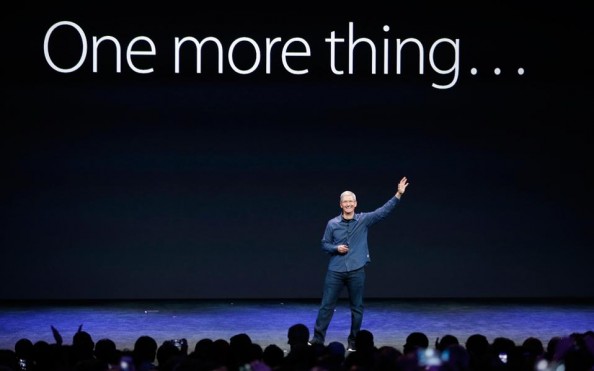(As Apple announced it’s record quarterly net profit [7] of $18 billion this week, I’m re-posting/translating an article I wrote for the leading Greek newspaper Kathimerini [8], back in September 2014, after the Apple Watch announcement).
This week saw the announcement of the new generation of iPhone models, as well as the most expected Apple Watch, creating an enormous amount of discussion (2.4 million tweets using the official #AppleLive hashtag [1] during the announcement).
What drives so many to care about a product announcement? If someone would observe Apple’s announcements on the merit of their actual content, it’s not something impressive. The average person would at first see a series of slides filled with sales figures, followed by technical characteristics, mixed up with live presentations of products and a couple ad spots.
The apparent consideration is that following up on the event by watching the presentation and participating in discussions about it, has a value on it’s own. Apple has managed to develop it’s announcements as major events that define trends in the electronics industry not only in terms of what kinds of products are being developed, but also on the discussion around them. The second is equally important, since having products that are talked about is part of Apple’s image to consumers as providing the “best in the world” products. At the same time, this leads into further discussions and rumours on the next product announcement, in an endless cycle of indirect marketing for Apple. It’s not strange that even competitors such as HTC [2] and Blackberry [3] posted related tweets during this week’s event in order to get some small dose of the spotlight.
How has Apple managed to reach this position? It’s not something magical, the so-called “reality distortion field” (a term started in Steve Jobs’ era in order to initially define how his was inspiring Apple personnel to strive for the best, and later on his presentation method, effectively telemarketing to an audience of millions of people). Apple has been following the specific marketing strategy for several years now, beginning with it’s non participation on big industry conferences, but instead organising independent events during which it doesn’t have to share media attention with other companies.
Additionally, Apple’s events are scheduled on set intervals (the biggest one being the annual update of the iPhone and later in the year of the iPad), so that people now when to expect the next generation of devices. Build-up to the events starts weeks and months beforehand with news leaks (although Apple maintains an image of secrecy and complete media blackout), creating hype and interest on whether the leaks are true or not.
On a second stage, Apple’s events are followed by massive advertisement campaigns. This time, it actually begun at the last few minutes of the event itself, with the announcement of the free distribution of the new U2 album to all iTunes users. A first estimate is referring to a 30-day campaign with a cost of $100 million [4].
Apple is also differentiating in the manner that it’s products are almost always instantly available for sale. For example, iPhone will be on sale on September 19th, just 10 days after it’s announcement. In contrast, Apple’s competitors announce product months in advance of their commercial release, resulting in reduced interest from consumers by the time they become available. As for Apple, in the coming week it will feed the media with announcements on the availability of new iPhone models in more that the initial number of countries, about (scheduled or not) availability shortages, as well as triumphant news of sales records being broken.
At the same time, a constant comparison between Apple and it’s competitors take place. A technological division on the basic choice of the Apple vs Android ecosystems (previously Apple vs Microsoft), leads to a lot of noise similar to the rivalries of football teams. Obviously, this is always interesting for news media as well as the technology enthusiasts, on whether the market leader will be to “do it one more time” or “utterly fail”.
That said, while this year (due to the Apple Watch announcement), we witnessed even fashion media, such the Marie Claire magazine [5], covering an Apple event, the general public hasn’t paid much attention. Just to note that during the recent World Cup final, more than 35.6 million tweets were sent [6], about 15 times more than during Apple’s event. For Αpple though, this is just the beginning, as discussion around it’s products will continue in the coming days and weeks as the models are released into the market.
//
Links
[1] “Twitter Erupts During Apple’s iPhone and Watch Event”, CIO.com http://bit.ly/1DtDvFT
[2] “Bigger screen. Better performance. Elegant design. Welcome to the party #iPhone6.”, @HTC Twitter account http://bit.ly/1BOaLaQ
[3] “Rumor has it we’ll hear about #iOS8 today… but #BlackBerry10 remains the winning choice for #enterprise”, @BlackBerry Twitter account http://bit.ly/1tPRDJl
[4] “U2, Apple and the Deal Behind Getting ‘Songs of Innocence’ Free of Charge”, Wall Street Journal http://on.wsj.com/1BObfOd
[5] “What’s hidden underneath this white box is the talk of the town. Keep following to find out #AppleLive”, @ marieclaire Twitter account http://bit.ly/1yZGEIX
[6] “Insights into the #WorldCup conversation on Twitter”, Twitter.com http://bit.ly/1zpZeiS
[7] “Apple Reports Record First Quarter Results”, Apple.com http://bit.ly/160111Y
[8] (Greek) “Γιατί η Apple κάνει τόσο πολύ θόρυβο;”, Kathimerini http://bit.ly/1D3fl6g
Tags: Android, Apple, Apple Watch, iPhone, marketing, technology





